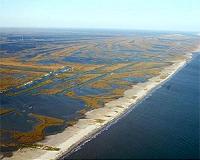| . |  |
. |
Washington DC (SPX) Nov 03, 2010 The ocean surface is 30 percent more acidic today than it was in 1800, much of that increase occurring in the last 50 years - a rising trend that could both harm coral reefs and profoundly impact tiny shelled plankton at the base of the ocean food web, scientists warn. Despite the seriousness of such changes to the ocean, however, the world has yet to deploy a complete suite of available tools to monitor rising acidification and other ocean conditions that have a fundamental impact on life throughout the planet. Marine life patterns, water temperature, sea level, and polar ice cover join acidity and other variables in a list of ocean characteristics that can and should be tracked continuously through the expanded deployment of existing technologies in a permanent, integrated global monitoring system, scientists say. The Partnership for Observation of the Global Oceans (POGO), representing 38 major oceanographic institutions from 21 countries and leading a global consortium called Oceans United, will urge government officials and ministers meeting in Beijing Nov. 3-5 to help complete an integrated global ocean observation system by target date 2015. It would be the marine component of a Global Earth Observation System of Systems under discussion in Beijing by some 71 member nations of the intergovernmental Group on Earth Observations. The cost to create an adequate monitoring system has been estimated at $10 billion to $15 billion in assets, with $5 billion in annual operating costs. Some 600 scientists with expertise in all facets of the oceans developed an authoritative vision of characteristics to monitor at a 2009 conference on ocean observations. Furthermore, as documented in the forthcoming proceedings of the 2009 conference (to be published shortly by the European Space Agency), the value of such information to the world's financial interests and to human security would dwarf the investment required. "Although the US and European Union governments have recently signaled support, international cooperation is desperately needed to complete a global ocean observation system that could continuously collect, synthesize and interpret data critical to a wide variety of human needs," says Dr. Kiyoshi Suyehiro, Chairman of POGO. "Most ocean experts believe the future ocean will be saltier, hotter, more acidic, and less diverse," states Jesse Ausubel, a founder of POGO and of the recently completed Census of Marine Life. "It is past time to get serious about measuring what's happening to the seas around us." The risks posed by ocean acidification exemplify the many good reasons to act urgently. POGO-affiliated scientists at the UK-based Sir Alister Hardy Foundation for Ocean Science recently published a world atlas charting the distribution of the subset of plankton species that grow shells at some point in their life cycles. Not only are these shelled plankton fundamental to the ocean's food web, they also play a major role in planetary climate regulation and oxygen production. Highly acidic sea water inhibits the growth of plankton shells. The Foundation says the average level of pH at the ocean surface has dropped from 8.2 to 8.1 units, "rendering the oceans more acidic than they have been for 20 million years," with expectations of continuing acidification due to high concentrations of carbon dioxide in the atmosphere. Because colder water retains more carbon dioxide, the acidity of surface waters may increase fastest at Earth's high latitudes where the zooplankton known as pteropods are particularly abundant. Pteropods (see links to images below) are colorful, free-swimming pelagic sea snails and sea slugs on which many animals higher in the food chain depend. Scientists caution that the overall global marine impact of rising carbon dioxide is unclear because warming of the oceans associated with rising greenhouse gases in the air could in turn lead to lower retention of carbon dioxide at lower latitudes and to potential countervailing effects. Says Foundation Director Dr. Peter Burkill: "Ocean acidification could have a devastating effect on calcifying organisms, and perhaps marine ecosystems as a whole, and we need global monitoring to provide timely information on trends and fluxes from the tropics to the poles. Threatened are tiny life forms that help the oceans absorb an estimated 50 gigatonnes of carbon from Earth's atmosphere annually, about the same as all plants and trees on land. Humanity has a vital interest in authoritative information about ocean conditions and a global network of observations is urgently needed." Ocean conditions that require monitoring can be divided into three categories: + Chemical - including pollution, levels of oxygen, and rising acidity; + Physical / Geological - including sound, tide and sea levels, as well as sudden wave energy and bottom pressure changes that could provide precious minutes of warning before a tsunami; and + Biological - including shifts in marine species diversity, distribution, biomass and ecosystem function due to changing water conditions.
Share This Article With Planet Earth
Related Links Ocean Obs 09 Water News - Science, Technology and Politics
 The Troubled Islands Of The Mississippi Delta
The Troubled Islands Of The Mississippi DeltaBoulder CO (SPX) Nov 02, 2010 The islands flanking the outlet of the Mississippi River are not only facing losses due to sea level rise and local subsidence, according to one study, but new unknown impacts from oil recovery operations, say researchers working on another project. Both will be presenting their work on Nov. 1 and 2 at the meeting of the Geological Society of America in Denver. Some islands could disappear ... read more |
|
| The content herein, unless otherwise known to be public domain, are Copyright 1995-2010 - SpaceDaily. AFP and UPI Wire Stories are copyright Agence France-Presse and United Press International. ESA Portal Reports are copyright European Space Agency. All NASA sourced material is public domain. Additional copyrights may apply in whole or part to other bona fide parties. Advertising does not imply endorsement,agreement or approval of any opinions, statements or information provided by SpaceDaily on any Web page published or hosted by SpaceDaily. Privacy Statement |